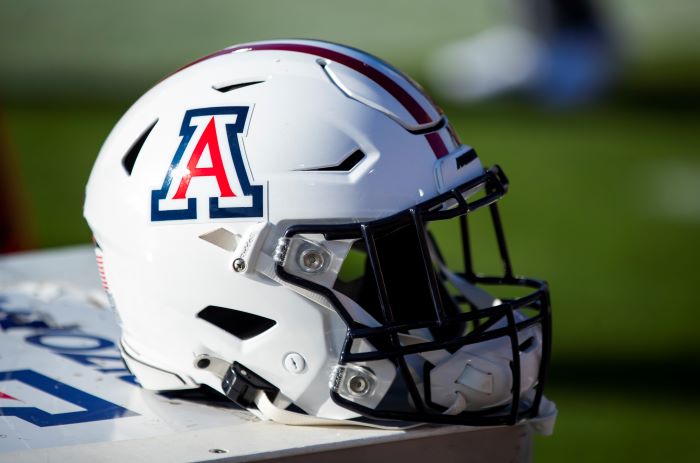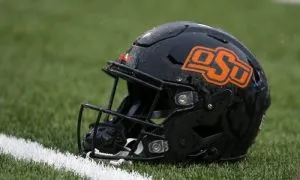The Arizona Wildcats are close to being official members of the Big 12 Conference after accepting the invitation last year when the Pac-12 fell apart.
Arizona spent more than 40 years affiliated with the Pac-12, so moving to the Big 12 is a big chance for the Tucson, Ariz.-based institution. It’s also a new rival for current Big 12 schools to get to know as the Wildcats officially join the league on Aug. 2.
Here are five things to know about the Wildcats as their tenure in the Big 12 begins.
THE HISTORY
When the University of Arizona was established in 1885, Arizona wasn’t officially a state — that didn’t happen until 1912. But, like many Big 12 schools, Arizona is a land grant university, borne out of the Morrill Land-Grant Act of 1862.
Over time, the school has grown into one of the largest in the country. In 2023, Arizona’s combined enrollment of all of its colleges, including medical and law schools, was more than 53,000.
Athletically, Arizona didn’t join a conference until 1931, when the Wildcats joined the Border Conference, a league that once included Texas Tech. Arizona joined the WAC in 1962, followed by a move to the Pac-8 in 1978. It should be noted that Arizona made those moves in concert with in-state rival Arizona State.
THE SPORTS
Arizona sponsors 18 varsity sports entering the 2024-25 season. The Wildcats have won 19 national championships across their team sports, but none has been more successful than softball. The Wildcat softball team has eight national crowns, with its last coming in 2007. It’s considered one of the standard-bearer programs in the country. Five players, including legendary pitcher Jennie Finch, have had their numbers retired.
On the women’s side, golf has three national crowns, and swimming has one.
On the men’s side, Arizona won one national title in basketball under the legendary Lute Olson. Baseball has won four national titles, while golf and swimming each have one.
The school has a host of notable athletic alums, including Steve Kerr, Sean Elliott, Jason Terry, and Damon Stoudamire in men’s basketball; Adia Barnes in women’s basketball; Tedy Bruschi, Lance Briggs, Nick Foles, and Rob Gronkowski in football; and Jim Furyk, Annika Sorenstam, and Lorena Ochoa in golf.
Football, notably, has never won a national title. Perhaps the closest it came was in 1998 when it went 12-1 and beat Nebraska in the Holiday Bowl. Arizona was No. 5 in the final AP poll that season. The Wildcats finished the year at 10-3 this past season and ranked 11th in the final polls. There are some questions after the departure of Jedd Fisch, but Brent Brennan has the talent in place to make some noise from the start.
THE RIVALRIES
For Arizona, it’s Arizona State. So that’s simple. Both schools and their rivalry pre-date statehood, as they played in football for the first time in 1899. While the game is one of the oldest rivalries in college football, the trophy — the Territorial Cup — has been certified by the NCAA as football’s oldest rivalry trophy. It was created for the first game, in which Arizona State (then Normal School of Arizona) beat Arizona 11-2.
Although the game hasn’t been played every year, the Wildcats and Sun Devils have met 97 times in football, with Arizona in the lead, 51-44-1, in what they call the Territorial Cup Series.
The men’s basketball rivalry dates back to 1913, and the baseball teams first met in 1959.
THE COACHES
Brent Brennan took over as football coach in the offseason after Jedd Fisch bolted for Washington (after Kalen DeBoer bolted for Alabama after Nick Saban bolted for retirement — it’s a small world after all). Brennan had one of the tougher jobs in Division I as he led San Jose State for seven seasons. While he went 34-48, he led them to three seven-win seasons and a national ranking in the COVID-shortened 2020 season.
He spent a season at Arizona as a graduate assistant under the legendary Dick Tomey.
In basketball, Tommy Lloyd is the men’s coach. The long-time Gonzaga assistant took over the Wildcats in 2021 and won two Pac-12 regular-season titles and two Pac-12 Tournament titles. He is 88-20 in three seasons and has taken the Wildcats to two Sweet 16’s.
Adia Barnes is the women’s coach. She played her college ball at Arizona and was the Wildcats’ first player to be drafted by the WNBA. She played seven years there, played internationally and then moved into coaching as an assistant at Washington. She took over her alma mater in 2016. In eight seasons, she is 150-100 with a national finals appearance in 2021, four NCAA Tournament bids, and a WNIT title.
Chip Hale, an Arizona alum who helped the Wildcats win the 1986 College World Series, is entering his fourth season as head baseball coach. He’s won at least 30 games in each of his first three seasons and has been to the NCAA Tournament all three years. He played nearly a decade in the Majors, coached five MLB teams, and managed the Arizona Diamondbacks for two seasons.
Like Hale, Caitlin Lowe is an Arizona alum and is entering her fourth season as softball coach. As a player, she won two Women’s College World Series titles with the Wildcats and a silver medal in the 2008 Summer Olympics. The four-time All-American is considered one of the greatest players in the game’s history. In her first three seasons, she has already taken the Wildcats to the WCWS and to an NCAA Super Regional.
THE FUTURE
Arizona is a well-balanced athletic department with stability in four of its five big sports. Brennan appears to be a long-haul type of coach as he jumped at the chance to return to Arizona, even though he only spent one year with the school under Tomey.
The Wildcats should be a competitive fit right away in men’s and women’s basketball, baseball, and softball. Football will be interesting in its first Big 12 season just because the conference is so balanced, and there is usually more turnover with a coaching change, especially in the transfer portal era.
But the school is charting a new course under athletic director Desireé Reed-Francois, who most recently was the AD at Missouri and earned her law degree at Arizona.
Her biggest issue isn’t hiring coaches. It’s solving a $177 million shortfall in athletics funding discovered last year. The department was $32 million over budget in fiscal year 2023, and while the increase in revenue joining the Big 12 will help, revenue sharing coming to college sports—as much as $22 million per year for student-athletes—means Reed-Francois has hard work ahead.
You can find Matthew Postins on Twitter @PostinsPostcard.

























